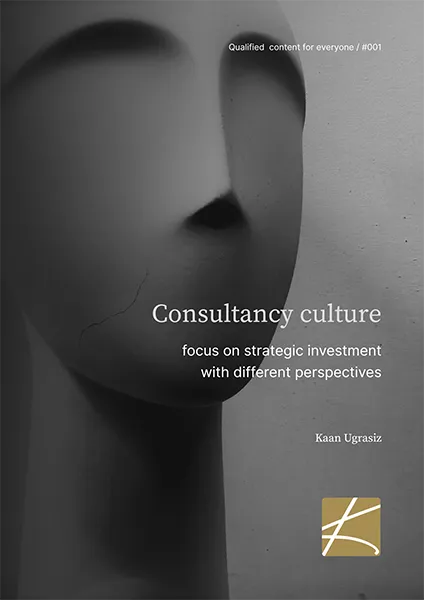Companies’ hesitation to seek consulting services of any kind can be attributed to factors such as the cost of consulting, trust in the consultant, concerns about process management, lack of prior preparation, and psychological resistance.
Cost is the first of these. Consulting services often involve training, human resources, and even subcontracting, which is difficult to separate on the balance sheet. It’s not surprising that additional costs not included in the contract arise during outsourcing. This unexpected situation disrupts the annual plans of companies that operate with annual budgets, leading to general uncertainty. Unplanned expenses are every company’s worst nightmare.
Consulting is a process, and it may not always be possible to set a definitive timeline for its completion. Therefore, the difficulty and uncertainty surrounding the process is another key factor that causes companies to shy away from consulting services.
Trust is another significant factor in avoiding consulting services. There’s always the possibility that the knowledge, experience, and fluency of the individual or firm providing the consulting services may not meet the expectations of the company requesting the consulting service. This inadequacy not only limits the ability to meet the needs of the corporate structure but also significantly reduces trust in consulting services.
Today, many managers worry about whether external intervention within their company will fully adapt to the company’s culture and current dynamics.
Consulting isn’t just about someone coming to the company regularly, holding meetings with people, and telling managers what to do.
Before offering anyone any direction on an ongoing process, regardless of its size, the consultant must thoroughly analyze, plan, and implement the process, and then monitor the progress.
It’s also common for some managers to be wary of suggestions from outside the company. Psychological factors such as criticism, rejection, and even resistance to change can create incompatibilities in implementing the consultant’s suggestions.
Is consultancy a threat to “comfort zone”?
Corporate structures offer a kind of power base for some people in management positions.
Managers who want to maintain their current status and authority may fear that hiring a consultant will restrict their authority and decisions, thus perceiving consultants as a threat to their power. This is another reason why managers may be wary of the concept of consulting.
Shifting power balances within the organizational chart, the need to redefine certain responsibilities, and a reluctance to share authority are significant resistances to the consulting process. This is a significant factor negatively impacting the success of the consulting process.
Accepting in advance that consulting services will bring about change makes the entire process easier to manage.
Change brings with it the abandonment of certain habits, a period of uncertainty, and concerns about job security. Regardless of the level, change will result in a loss of comfort zone for one or a group of employees and the need to develop new skills. This is a significant reason why employees may be reluctant to collaborate with a consultant.
Before properly directing a consultant, understanding the company’s needs is paramount, and clear and concise objectives are crucial for ensuring the process is sustainable. Seeking consultancy without preparation prolongs the service received, reduces its effectiveness, and prevents the company from receiving the expected service.
To encourage company employees and managers to provide adequate and enthusiastic support for the consultancy, ensuring open communication about the consultancy process and avoiding actions that create uncertainty and anxiety will weaken the employee’s resistance to the consultancy process and consultants.
Knowing that consultancy is not a conflict with company employees, but rather a collaborative process of developing solutions, will make employees feel good about themselves.
Reduce reluctance and resistance to consulting, the following are appropriate initial solutions:
- Listening openly to the concerns of employees and managers,
- Transparently explaining the benefits of the change that consulting and advisory processes will bring to all stakeholders,
- Senior management supporting this process with strong leadership,
- Designing the consulting process to align with the company’s existing culture,
- Establishing ethical and active communication channels and involving managers in the consulting process at every stage.

Download e-paper for free: You’re going to find these topics in this document:
- What is consultancy and “not”?
- The foundations of a concultancy culture
- How does consulting affect business culture?
- Approaches to consulting culture
- Why companies avoid seeking consultancy?
- Consultancy as a “comfort zone” threat
- Reducing reluctance and resistance to consulting
- The cost of getting consultancy and hiring a consultant
- What are the factors affecting consultancy fees?
- Reluctance to seek advice in the family biz






